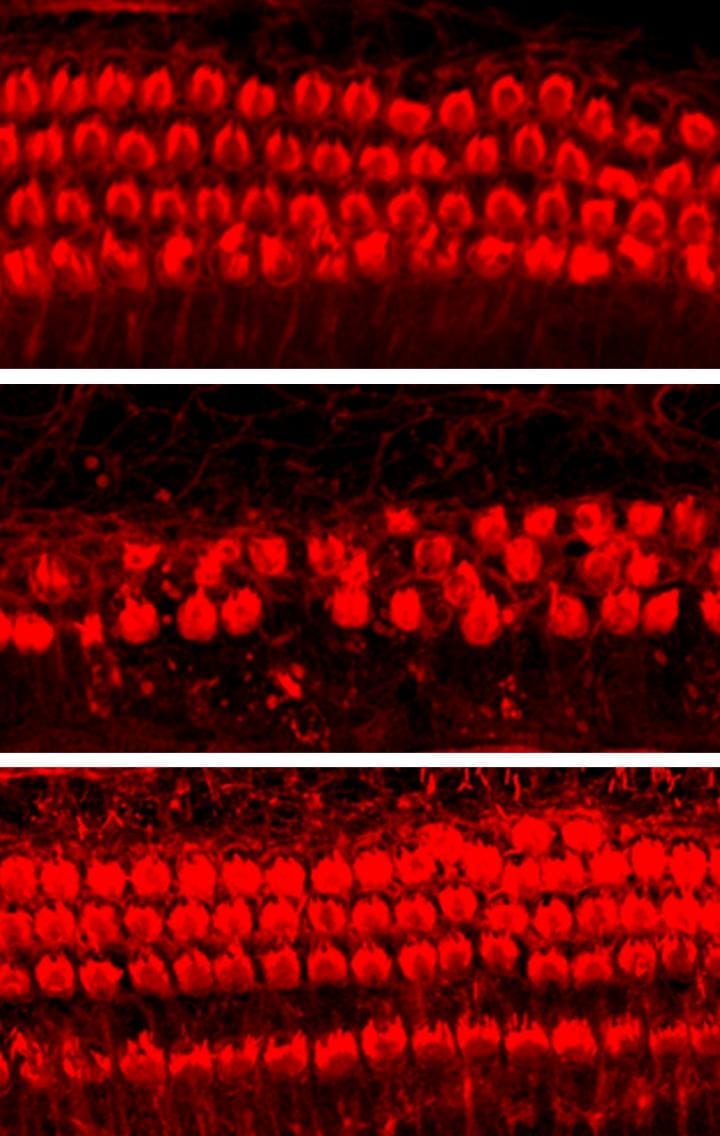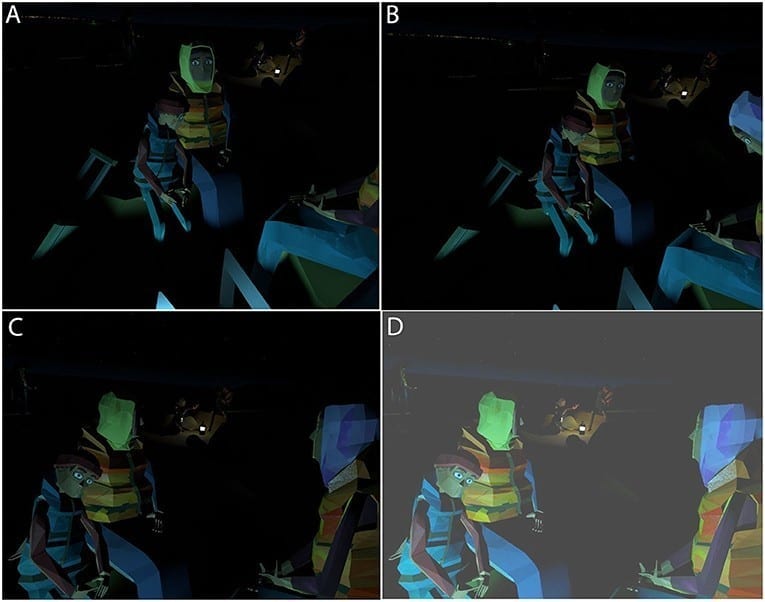
Researchers have taken an important step toward what may become a new approach to restore hearing loss. In a new study, out today in the European Journal of Neuroscience, scientists have been able to regrow the sensory hair cells found in the cochlea – a part of the inner ear – that converts sound vibrations into electrical signals and can be permanently lost due to age or noise damage.
Hearing impairment has long been accepted as a fact of life for the aging population – an estimated 30 million Americans suffer from some degree of hearing loss. However, scientists have long observed that other animals – namely birds, frogs, and fish – have been shown to have the ability to regenerate lost sensory hair cells.
“It’s funny, but mammals are the oddballs in the animal kingdom when it comes to cochlear regeneration,” said Jingyuan Zhang, Ph.D., with the University of Rochester Medical Center (URMC) Department of Neuroscience and first author of the study. “We’re the only vertebrates that can’t do it.”
Research conducted in the lab of Patricia White, Ph.D., in 2012 identified a family of receptors – called epidermal growth factor (EGF) – responsible for activating support cells in the auditory organs of birds. When triggered, these cells proliferate and foster the generation of new sensory hair cells. She speculated that this signaling pathway could potentially be manipulated to produce a similar result in mammals. White is a research associate professor in the URMC Del Monte Institute for Neuroscience and lead author of the current study.
“In mice, the cochlea expresses EGF receptors throughout the animal’s life, but they apparently never drive regeneration of hair cells,” said White. “Perhaps during mammalian evolution, there have been changes in the expression of intracellular regulators of EGF receptor family signaling. Those regulators could have altered the outcome of signaling, blocking regeneration. Our research is focused on finding a way switch the pathway temporarily, in order to promote both regeneration of hair cells and their integration with nerve cells, both of which are critical for hearing.”
In the new study, which involved researchers from URMC and the Massachusetts Ear and Eye Infirmary, which is part of Harvard Medical School, the team tested the theory that signaling from the EGF family of receptors could play a role in cochlear regeneration in mammals. The researchers focused on a specific receptor called ERBB2 which is found in cochlear support cells.
The researchers investigated a number of different methods to activate the EGF signaling pathway. One set of experiments involved using a virus to target ERBB2 receptors. Another, involved mice genetically modified to overexpress an activated ERBB2. A third experiment involved testing two drugs, originally developed to stimulate stem cell activity in the eyes and pancreas, that are known activate ERBB2 signaling.
The researchers found that activating the ERBB2 pathway triggered a cascading series of cellular events by which cochlear support cells began to proliferate and start the process of activating other neighboring stem cells to become new sensory hair cells. Furthermore, it appears that this process not only could impact the regeneration of sensory hair cells, but also support their integration with nerve cells.
“The process of repairing hearing is a complex problem and requires a series of cellular events,” said White. “You have to regenerate sensory hair cells and these cells have to function properly and connect with the necessary network of neurons. This research demonstrates a signaling pathway that can be activated by different methods and could represent a new approach to cochlear regeneration and, ultimately, restoration of hearing.”
Learn more: Study Points to Possible New Therapy for Hearing Loss
The Latest on: Hearing restoration
[google_news title=”” keyword=”hearing restoration” num_posts=”10″ blurb_length=”0″ show_thumb=”left”]
via Google News
The Latest on: Hearing restoration
- Hearing-loss prevention a tough seed to plant on farmson April 27, 2024 at 10:50 pm
Hearing loss often is seen as an invisible disability, if it’s considered a disability at all. But out of sight doesn’t mean nonexistent, especially on farms.
- Understanding Age-Related Hearing Loss as Clarity, Not Volume, Is Key Says U of Minnesota Experton April 26, 2024 at 9:00 pm
Professor Matthew Winn of the University of Minnesota explains how age-related hearing loss blurs sounds, affecting clarity and sound separation.
- Study provides opportunities for testing drugs that can prevent hearing loss from loud music and agingon April 26, 2024 at 5:15 pm
USA: A recent study published in the Journal of Clinical Investigation Insight has provided evidence that TMTC4 is a deafness gene in humans and further implicates the unfolded protein ...
- How much do hearing aids cost?on April 26, 2024 at 9:59 am
When it comes to hearing aid prices, there are two groups to consider: prescription hearing aids and over-the-counter hearing aids (OTC). less than $1,000 and ...
- Does Medicare pay for hearing aids?on April 26, 2024 at 9:58 am
The average cost of hearing aids was around $4,600 as of 2018, but these days a pair of prescription-grade hearing aids can cost anywhere from $1,000 to more than $8,000 a pair. Over-the-counter or ...
- The best hearing aids you can buy onlineon April 26, 2024 at 9:58 am
At $397 per pair, this hearing aid is the epitome of quality OTC hearing aids you can buy online: cheap, effective, and with a light design that makes for true all-day comfort. Small, nearly invisible ...
- Watch a little boy smile at hearing his parents speak with the help of cochlear implantson April 25, 2024 at 10:14 am
Nate was born with sensorineural hearing loss and relied on hearing aids. But as his hearing deteriorated, the hearing aids became less effective. To help him, he was fitted with a cochlear implant, a ...
- Untreated hearing loss triples the risk of fallingon April 23, 2024 at 9:31 pm
Untreated hearing loss triples the risk of falling due to the brain having fewer resources to manage balance and gait. And since falls are the leading cause of death and hospitalization for those 65 ...
- Hearing loss leads musician to make music from natureon April 21, 2024 at 9:09 am
A musician who experienced sudden hearing loss says it has spurred her on to make music in new and creative ways using nature. Cheryl Beer, 58, said her hearing loss "literally happened overnight".
via Bing News










